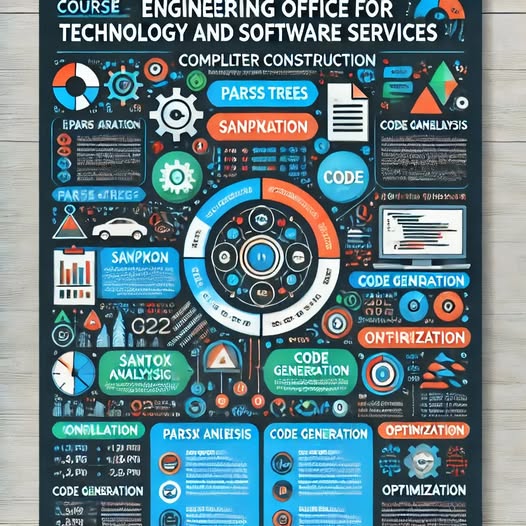
About Course
🛠 Compiler Construction Course
Course Code: 27020-COs
Academy: Engineering Office for Technology and Software Services
🧩 Introduction
Compiler Construction dives deep into the engineering behind building compilers — software that translates high-level programming languages into executable code. This course blends theoretical foundations with practical implementation, guiding learners through the full pipeline of a compiler: from scanning and parsing to code generation and optimization.
🎯 Course Modules
🔹 Module 1: Introduction to Compiler Construction
-
What is a Compiler and why do we need it?
-
Differences between Compiler and Interpreter
-
Phases of compiler construction (Compilation Phases)
🔹 Module 2: Lexical Analysis
-
Definition and role of Lexical Analysis
-
Writing a Lexer and analyzing Tokens
-
Tools for lexical analysis (e.g., Flex)
🔹 Module 3: Syntax Analysis
-
Definition of Syntax Analysis and building a Parse Tree
-
Grammar rules and language syntax
-
Types of parsers (e.g., LL, LR)
🔹 Module 4: Semantic Analysis
-
Semantic checking and validation
-
Managing Symbol Tables
-
Scope management and Type Checking
🔹 Module 5: Intermediate Code Generation
-
What is Intermediate Code?
-
Representing code as Three Address Code
-
Translating arithmetic and logical expressions into intermediate code
🔹 Module 6: Code Optimization
-
Intermediate-level code optimization
-
Reducing code size and improving efficiency
-
Optimization techniques like Loop Optimization
🔹 Module 7: Target Code Generation
-
Translating intermediate code into Machine Code
-
Register allocation strategies
-
Generating optimized code for various processors
🔹 Module 8: Memory Management
-
Memory allocation and management during execution
-
Handling variables, Stack, and Heap
-
Garbage collection strategies
🔹 Module 9: Practical Applications and Projects
-
Building a simple compiler for a custom programming language
-
Using tools like Flex and Bison
-
Implementing and optimizing target code on a chosen platform
-
🎯 Course Outcomes
By the end of this course, you will be able to:
-
✅ Understand and implement each stage of the compiler pipeline
-
✅ Construct lexical and syntax analyzers using tools like Lex/Flex and Yacc/Bison
-
✅ Analyze and implement semantic checks, intermediate code, and optimizations
-
✅ Generate target machine or bytecode from intermediate representations
-
✅ Develop a working compiler for a small custom programming language
-
✅ Use modern compiler tools such as LLVM and ANTLR in practical contexts
-
✅ Apply formal language and automata theory in real-world applications
🕒 Time Frame
-
Duration: 8 Weeks
-
Sessions: 16 sessions (2 per week)
-
Session Length: 1.5 to 2 hours per session
-
Project Work: Weekly assignments and a final compiler project
🗂️ Course Format
-
📺 Live or recorded lectures with hands-on code walkthroughs
-
🧪 Practical Labs after every core module
-
💻 Code assignments and quizzes via learning platform (LMS)
-
🛠 Compiler Construction Project: build your own basic language compiler
-
👨🏫 Mentor support & discussion forum for Q&A
-
📜 Certificate awarded upon successful completion and project submission
-
Course Content
🛠 Compiler Construction
Student Ratings & Reviews



